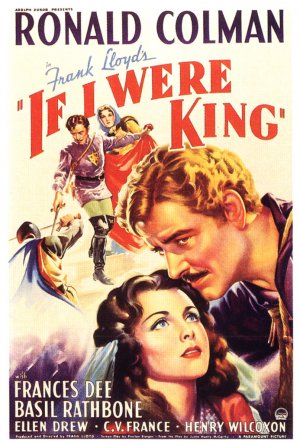
IF I WERE KING
US, 1938, 101 minutes, Black and white.
Ronald Colman, Basil Rathbone, Frances Dee, Ellen Drew, Henry Wilcoxon, Heather Thatcher.
Directed by Frank Lloyd.
If I Were King is based on a play about rogue and poet, Francois Villon. He was already the subject of a silent film with the same title. He also lived at the time of the fictitious Hunchback of Notre Dame, some years after the wars against England and the death of Joan of Arc.
Ronald Colman portrays the poet, made to stand in for the Grand Constable of France (who was the traitor sought by King Louis XI). There is some comedy, romancing, swashbuckling.
Ronald Colman, that most debonair of English actors in Hollywood, had appeared in A Tale of Two Cities and Lost Horizons amongst other films. He was soon to make The Talk of the Town and Random Harvest and win an Oscar in 1947 for A Double Life. Basil Rathbone continues his role as the arch and sardonic villain. The leading ladies were Frances Dee (Joel McCrea’s? wife) and Ellen Drew at the beginning of her career.
The film was directed by Scots-born Frank Lloyd who won an Oscar for The Divine Lady, director, 1930, which was not nominated for best film. However, he also won an Oscar for Cavalcade in 1933 which was the winner of best film. Amongst his other films were Mutiny on the Bounty.
The musical version of If I Were King, The Vagabond King (with music by Herbert (Rudolf?) Friml) was made in 1956 with Maltese opera singer Oreste Kirkop and Kathryn Grayson in the lead, directed by Michael Curtiz (better known for Casablanca).
1. The appeal of the historical melodrama, the atmosphere of the French Middle Ages, social questions, romantic heroes?
2. The film as an example of 1930s filmmaking, black and white photography, the reliance on sets, lavish costumes, the re-creation of Paris and France of the 15th century? The impact of Ronald Colman and Basil Rathbone?
3. The traditional values that are incorporated in this kind of historical melodrama: the traditions of good and bad, power, war, love, leadership?
4. How well did the film recreate the situation of France and of Paris at the time? The plight of the ordinary people, the atmosphere of oppression, life in the taverns and in the slums? The influence of Louis and his tyranny? The Duke of Burgundy and the reasons for his invasion? The atmosphere of despair and defence?
5. What kind of character was Francois Villon? The poet of the people, his popularity, his dash and daring, his role as a vagabond king? How well did the film delineate his character, his patriotism, his creativity, his attitude towards the king of France and the way that he expressed it (even in Louis' presence? his relationship with the ordinary people?
6. How attractive was Katherine as a heroine? As a lady of the court, her falling in love with Villon, the dangers? The romantic scenes and audience response?
7. The portrayal of King Louis as a character, as a tyrant? What did he understand when he listened to the people in the tavern? His reliance on his advisors?
8. The shrewdness of Louis in getting Villon to be the leader of the people? The scenes of battle and his success? His relationship with the minor characters, especially those of the court, the nobles and their duplicity, their support and lack of support of the ordinary people in the taverns, their allegiance to Villon, their loyalty?
9. The presentation of patriotism, the social awareness? The appropriateness of the happy ending?
10. A good example of historical melodrama?